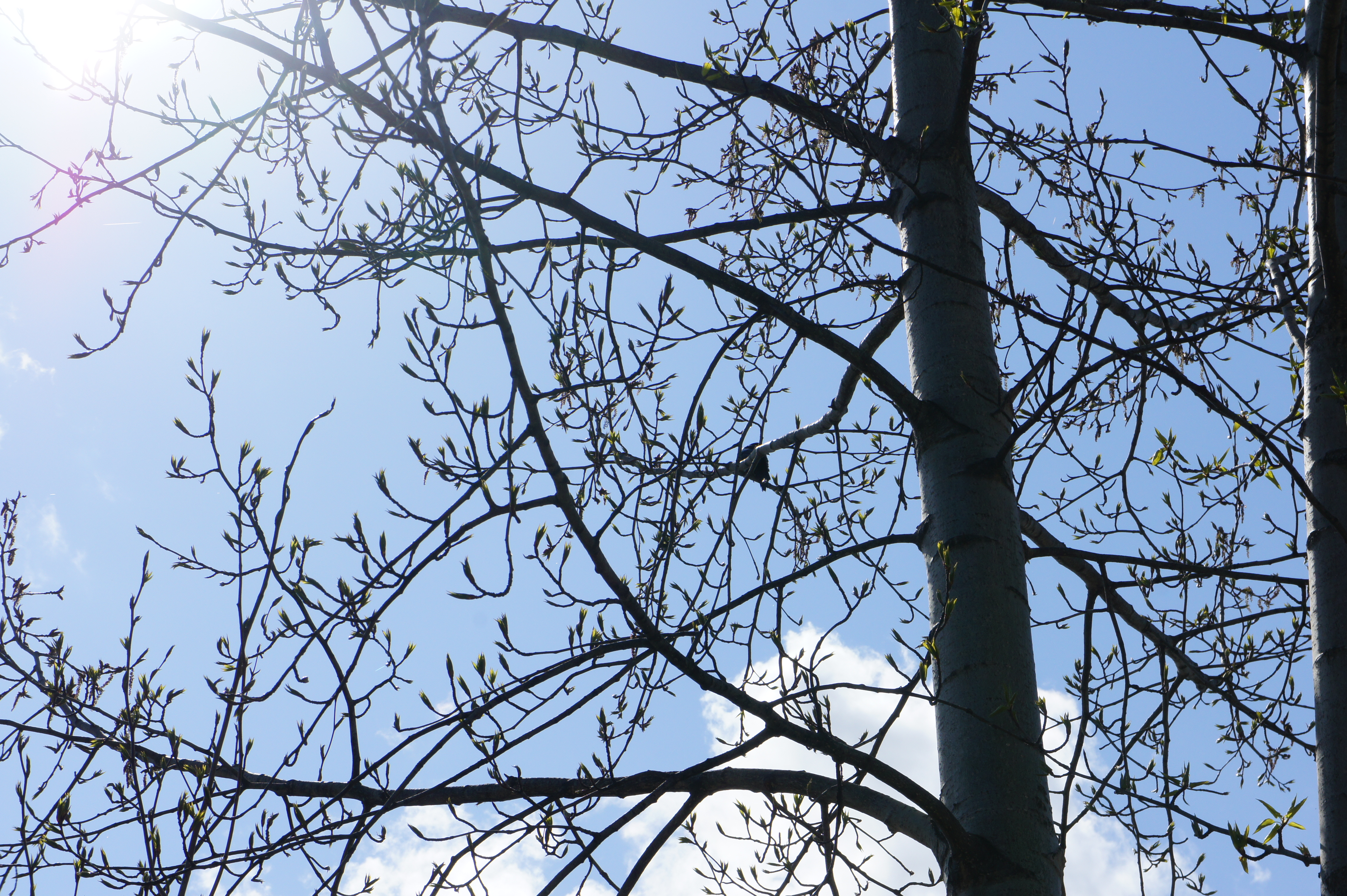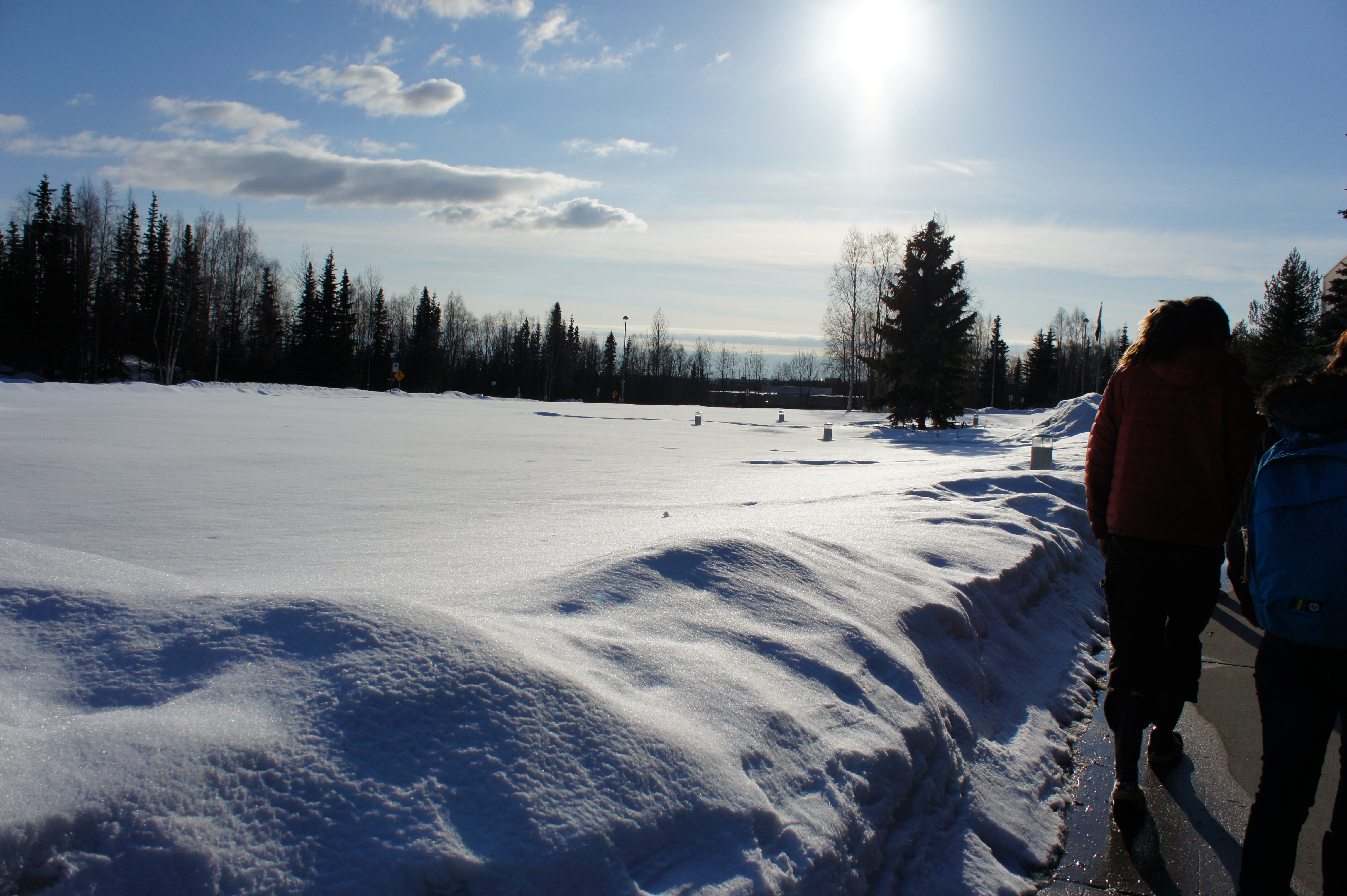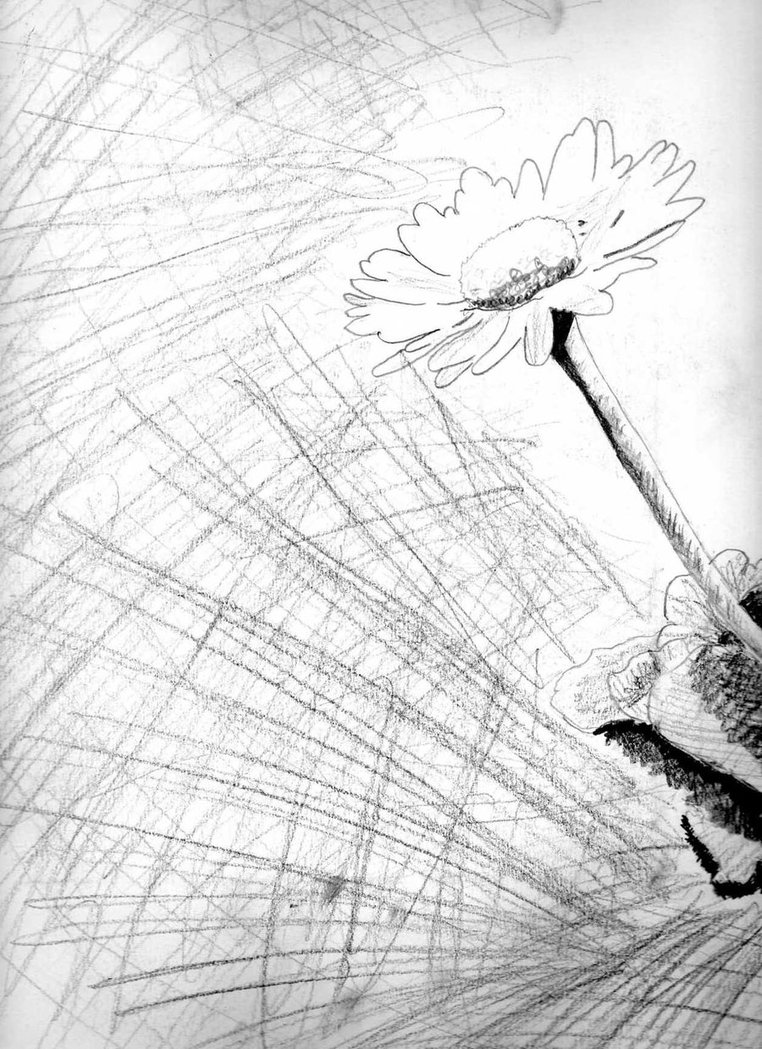by Krista Ruesch
Rays of golden sunshine stretch over the tops of snowcapped mountains, across the windswept landscape and the wide expanse of the frozen river, giving the illusion of warmth, even at -20˙F. Deep within the woods, June stands shoulder to shoulder with a young spruce tree, trying to decide what direction to move in next. Her petite and muscular build holds her strong to the earth, yet she carries a subtle air of vulnerability, as if the world could swallow her whole, taking her underground and into an alternate universe, never to be seen again. Dressed in her lined coveralls and most serious pair of Sorel winter boots, June leans against the spruce, tuning her ear to the sounds of the silence, of snow and ice, and the sensation of the icy wind on her bare cheeks. The bare birch trees move with the wind, lying in wait for spring, waiting to be reborn.
June holds her ear steady, focused on their rhythm and shaking, the pulsing in the wind—the heartbeat of the forest, subtle and faint. Once, when she was seven, she ran away from her foster family and got lost deep in the woods. She spent the night alone, shivering from the cold, feeling powerless in the face of an impossible situation, thinking with greater hysteria that: This place could swallow me whole.
June rests against the young spruce, standing small against the trees in the forest, feeling unafraid, curious, and deeply mystified, trying to decipher the secret language of the trees, trying to find her way back home. Even as a child, June knew that within the sounds of the trees lies a sacred knowledge and secret stories intricately woven with truth, wisdom, and faith—the answer hiding in plain sight within the landscape itself, only accessible to those who do not wish to change it.
June began talking to the trees before she could communicate with people. Her mother would sit her out the playpen in their backyard and put on Sonny and Cher albums and drink glass after glass of rose wine, taking long sips from a coffee mug, making trip after trip into the house to refill her cup from the large glass jug she kept hidden in the laundry room. June would tune out Cher’s longing voice and tune out her incapable, unfit mother, and take in the stories of the trees instead. She would sit, listening to the trees tell stories to one another, laugh at each other’s jokes, and blossom as the leaves came of age over the course of the summer. When autumn came at the end of June’s second year, her mother disappeared from her life entirely, extinguished in a flash of mystery, leaving young June alone in the wake of her disappearance. The police found her five days after her mother vanished, having responded to a call from neighbors who had not seen any activity in the house for a number of days. The police found her sitting upright in the middle of her mother’s bedroom sucking on the edge of her mother’s silk nightgown. Unshaken by the storm that swept her mother away, she silently took comfort in the sensation of soft silk on her lips.
The early years spent in foster care were filled with a silent confusion and the stark absence of nature. June longed to escape into the woods every chance she got. As she matured into adulthood, she sought out the perfect life with passion and vigor, intent on making her life as normal as she possibly could. She chased perfection like a wolf chasing prey, as though her survival depended upon it. Shortly before June turned thirty she felt she had finally achieved her definition of the perfect life. She had graduated from college with honors, defying the odds and validating her existence in the process. The pain that stemmed from her mother’s disappearance was somehow reconciled in her accomplishments and attainment of the perfect life, and she was able to set the past aside and exist in an unfamiliar world of love, safety, and comfort. She tied herself to Paul, and created a net of safety in his arms. Paul was devoted and loving, a kind and content man. Together they shared the perfect life, the perfect house, but something June learned about perfection is that it is a moving target, in a state of perpetual motion. Paul was the first to make his move, his break from their perfectly false reality, but June felt it too, the longing, the desire for something more. In her brief stint with “normal,” June found it suffocating and bland, lacking enthusiasm and authenticity; she did her best to act the part, but never really felt as though she belonged in that concrete jungle. Everything she had worked so hard to attain meant nothing, because she was living a life not meant for her. She was living a lie.
Out here among the trees, June realized the urgency of the situation, the pull she felt to the land, the invisible force that delivered her to this place, despite the enormity of the tasks involved, the series of steps completed in a short expanse of time, all the steps along the way that paved her journey home. In her old life, she was surrounded by man-made perfection: polished Brazilian cherry floors; custom kitchen cabinetry that extended from the floor to the edge of the elevated ceiling; polished granite countertops; and strategically placed lighting that created an illusion of warmth and safety under their glow. She had to escape. Now, out here in the woods, June felt surrounded in natural perfection, untouched by the hand of man, existing in a simple, uncomplicated way. One makes a silent agreement with nature to embrace the perfection and recognize that everything is temporary and fleeting, and in order for life to be fully lived, it should be experienced on a moment to moment basis.
June holds the freshly sharpened axe, hands wrapped tightly in insulated gloves with rubberized fingers and palms to enhance grip and increase comfort, contemplating the young spruce before her. She gazes at the bark, the needles, pointing outward, stretching up to the sky, embracing the sunshine. She holds the axe tightly in her grip, preparing mentally to bring it to its knees and haul it back to decorate it with her young daughter Laura Mae, to mark their first Christmas in their little log cabin in the big woods on the edge of the wild. Eyeing the base of the young spruce, June makes mental notes, a sketch of the cuts she needs to make. But the idea of cutting down the tree feels like cutting out part of June’s soul, the murky depths she has not allowed herself to swim in, for fear of being pulled under the surface, getting lost in the underworld of water and feeling, the silence and absence of familiar sounds, the darkness.
June used to look ahead into the future and see limited freedom and insufficient room for adventure and experience. An unquenched thirst rose within her, until she had no other choice than to drink it up, to immerse herself in nature, and teach Laura Mae to swim freely within the depths of the wild places and spaces that exist only to those who wish to experience them. That is the magic the wild places in the world hold for the explorers, the adventurers—the magic is in the discovery, the moment. As June has begun to live a life focused in these moments, she finds herself drawn to the typewriter that had presented itself in the first week she and Laura Mae came home, in the early days of autumn, begging her to dust off her heart and mind. This place had given her permission, the right to write her story.
June had begun collecting the things she found. Broken things. Pieces and parts of things. Buried things, unearthed by the elements, by nature. Calling objects to the surface of the earth, bringing them to the light and heat, June began a collection of unfinished business, like puzzle pieces. She kept them, not knowing what they meant or what to do with them, but knowing they symbolized something real, some greater truth.
Preparing to make that first cut in a series of hits, June feels uneasy, uncertain, and small. The wingbeats of a raven overhead in the cold, crisp air break her concentration She pauses, contemplative and open to suggestion, searching for the secret answers. As an adult, June’s relationship to the trees has changed, drifted. She embraces them in everyday life, not only for their natural beauty but for their practical purpose, their life giving force: the log shell that makes up the unfinished cabin structure June and Laura Mae moved into in mid-August; the dining table and chairs; the firewood that keeps the wood stove burning hot; the handmade kitchen cabinets that store their cups and bowls, and breakfast cereal, and the sheets of plain paper, calling out, begging to be brought to life. The typewriter, unearthed from the barn, sits on a cobbled together table, symbolic of their journey here. They had found the old Royal typewriter buried in dirt and horse manure, cloaked in a protective plastic cover, as though it were waiting for June to arrive, to write the story of this place.
June lays the axe down in the sled and walks back to the house tugging at the rope, leaving smooth lines in the snow in her wake. She heads back up the hill, trudging through the snow, leaving the young spruce dancing in the wind, wild and free. She has decided to celebrate and honor its existence by watching it grow. The simple things bring the greatest happiness now. Standing on the other side of life, June starts to realize the humor of it all, the joke.
Living wild was just the change she and Laura Mae needed to cope with the heaviness, the grief and loss, of coping with Paul’s decision to leave behind his perfect life, and the perfect family they created together. Paul heard his own call of the wild: in the arms of a 23 year old psychology major with a taste for older men and the kind of sexual charm and romantic ease that June could never possess. June’s friends told her she was running away, moving into the wild. June argued the point vociferously. She was not running away from anything, but running towards something—something she couldn’t define or explain, responding only to the call of the trees, the call of the wild.
June brushes the snow off her boots, slipping them off inside the arctic entry, hanging the axe up on the pegs in the wall. Inside the cabin June finds Laura Mae still asleep, curled up beneath a sea of quilts, nestled in warmth, asleep, at ease. Round rosy cheeks, thick blonde curls, and silence. For all the heartache and pain her marriage to Paul created in her life, Laura Mae’s existence made every painful moment worth it. As the days passed by, June has changed the way she thinks of Paul. The rage she felt in the early days of autumn when she arrived at the cabin, began to evaporate with the falling of the first pure white snowflakes of October, the deep cold of the interior cooling the fiery rage in her heart, settling her mind down enough to focus, to sit with reality, the past. To live in such a way that encourages quiet contemplation, deep reflection, and careful observation. June longs for nap time, the only time of day that Laura Mae is silent. Though even in her sleep she is often deep in conversation with one spirit or another, speaking in a secret language to the creatures of the subconscious. Communicating freely, unhindered by the constraints of the adult world, existing in harmony with nature and the unseen world, Laura Mae is like the trees, natural, wild, roaming and free—all the while tied tightly to the watchful eye of her mother. June is beginning to understand the delicate balance of cultivating curiosity in nature and protecting her young daughter from the wild. She is slowly starting to discover there are no real answers to any questions, there are only merely suggestions, ideas, possibilities. Back in the city, June was filled with restlessness and longing, fear of death, fear of life. Afraid of everything, all the time. She came to this place, against the advice of everyone who knew her. She came here because she felt the pull of nature, drawing her and little Laura Mae back home. The idea that June could give her daughter this one gift, the gift of nature, was too good to pass up. June reasoned that there could be nothing more important than teaching her daughter the way of the wild, even if June herself didn’t know what it was. She knew that together in harmony with the landscape, they would figure it out.
Out here, tangled up in the wild landscape, June thought she might feel more terrified of the imminence of death, the reality of the passage of time—living closer to the circle of life, watching the struggle that winter brings to all living things. As June has allowed herself to relax and unfurl in this wild place, she has begun to feel very small, insignificant, and nearly non-existent. She finds the feelings comforting in a strange, sordid kind of way. The little log cabin in the woods is the first home June has ever really known, now among the trees, woods stretching for miles and miles, untouched by man, holding the answers in the tips of the spruce, along the frozen river’s edge.
[divider]
 Krista Ruesch is a writer, photographer, crafter and adventurer who blogs about her adventures living on the edge of Wrangell-Saint Elias National Park and Preserve. Krista is a recent graduate of Alaska Pacific University in the Business Administration and Management degree program with an emphasis in non-profit business. She graduated in December 2013, cum laude, with a senior project of distinction titled “Native Youth Olympics: Outcomes for Alaska Native Athletes”. In August 2013, The Wild family sold their perfect house in Anchorage, her husband quit his job and they moved into an unfinished log cabin 7 miles away from the nearest town of 100 people. Krista is blogging (as H.M. Wild) about her family adventures living on the edge of the wild, be part of the journey!
Krista Ruesch is a writer, photographer, crafter and adventurer who blogs about her adventures living on the edge of Wrangell-Saint Elias National Park and Preserve. Krista is a recent graduate of Alaska Pacific University in the Business Administration and Management degree program with an emphasis in non-profit business. She graduated in December 2013, cum laude, with a senior project of distinction titled “Native Youth Olympics: Outcomes for Alaska Native Athletes”. In August 2013, The Wild family sold their perfect house in Anchorage, her husband quit his job and they moved into an unfinished log cabin 7 miles away from the nearest town of 100 people. Krista is blogging (as H.M. Wild) about her family adventures living on the edge of the wild, be part of the journey!




